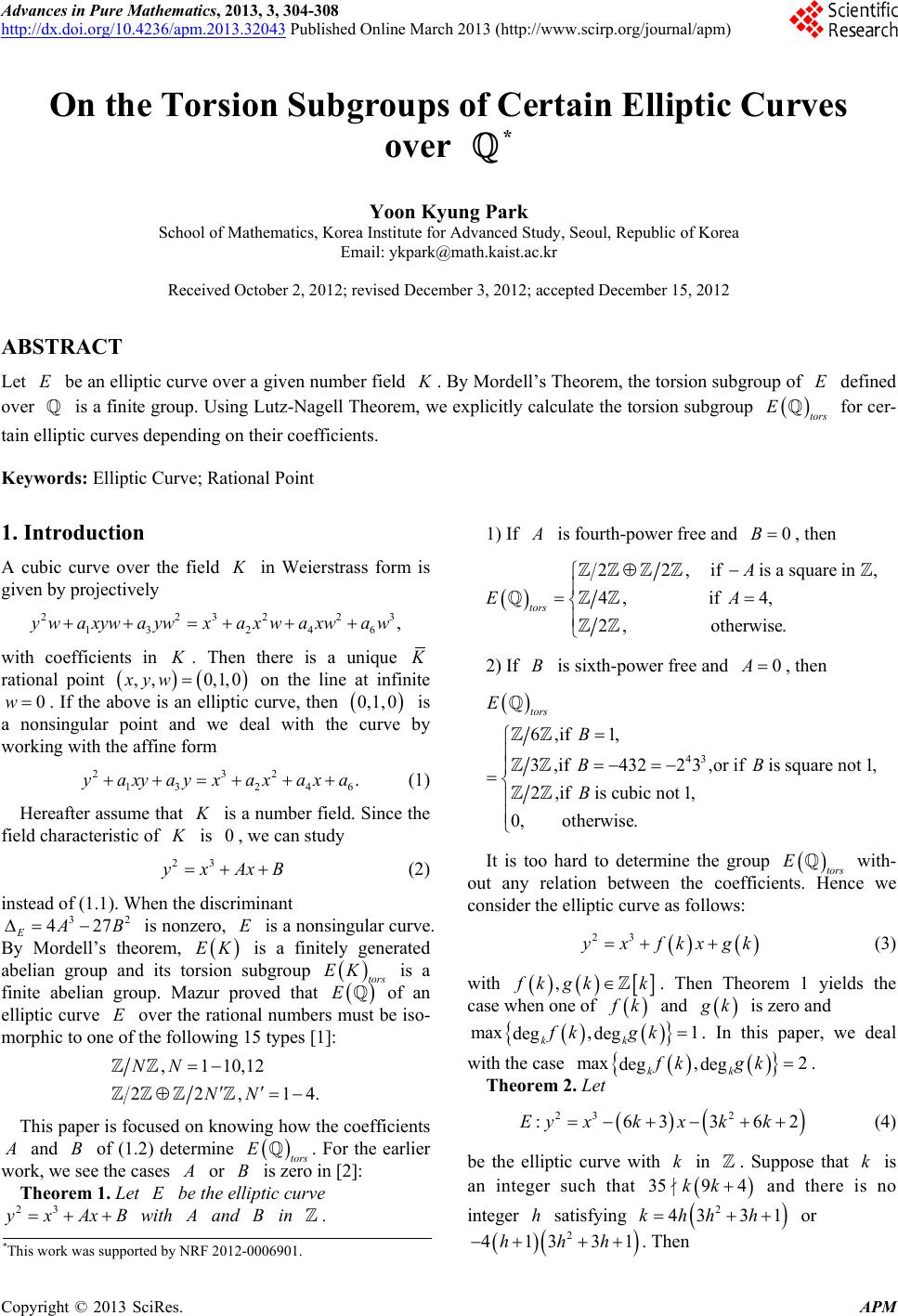 Advances in Pure Mathematics, 2013, 3, 304-308 http://dx.doi.org/10.4236/apm.2013.32043 Published Online March 2013 (http://www.scirp.org/journal/apm) On the Torsion Subgroups of Certain Elliptic Curves over * E Yoon Kyung Park School of Mathematics, Korea Institute for Advanced Study, Seoul, Republic of Korea Email: ykpark@math.kaist.ac.kr Received October 2, 2012; revised December 3, 2012; accepted December 15, 2012 ABSTRACT Let be an elliptic curve over a given number field . By Mordell’s Theorem, the torsion subgroup of defined over is a finite group. Using Lutz-Nagell Theorem, we explicitly calculate the torsion subgroup for cer- tain elliptic curves depending on their coefficients. E tors E K 223 246 , Keywords: Elliptic Curve; Rational Point 1. Introduction is fourth-power free and , then A cubic curve over the field in Weierstrass form is given by projectively 223 13 w axyw aywxaxw a xwa w with coefficients in . Then there is a unique rational point on the line at infinite . If the above is an elliptic curve, then is a nonsingular point and we deal with the curve by working with the affine form 0,1,0w 0,1,0 2 2 46 ,,xy 0w 23 13 . axy ayxaxax a (1) Hereafter assume that is a number field. Since the field characteristic of is , we can study 0 23 xAxB 32 427 (2) instead of (1.1). When the discriminant E BE EK tors EK E is nonzero, is a nonsingular curve. By Mordell’s theorem, is a finitely generated abelian group and its torsion subgroup is a finite abelian group. Mazur proved that of an elliptic curve over the rational numbers must be iso- morphic to one of the following 15 types [1]: E ,1 22 NN 10,12 ,14.NN This paper is focused on knowing how the coefficients and of (1.2) determine tors . For the earlier work, we see the cases B E or is zero in [2]: B Theorem 1. Let be the elliptic curve E 23 1) If 0B 22,ifisasquarein, 4,if 4, 2, otherwise. tors A EA B0A 2) If is sixth-power free and , then 43 6,if 1, 3,if4322 3 ,orifissquarenot1, 2,ifiscubicnot 1, 0, otherwise. tors E B BB B xAxB with and in . B It is too hard to determine the group tors with- out any relation between the coefficients. Hence we consider the elliptic curve as follows: E 23 yxfkxgk (3) with ,kgk k. Then Theorem 1 yields the case when one of k and k is zero and max ,1 deg deg kk fkgk. In this paper, we deal max ,2 deg deg kk fkgk. with the case Theorem 2. Let 23 2 :63362Ey xkxkk kk 359 4kk (4) be the elliptic curve with in . Suppose that is an integer such that and there is no integer satisfying h 2 433 1khhh or 2 41331hhh . Then *This work was supported by NRF 2012-0006901. C opyright © 2013 SciRes. APM 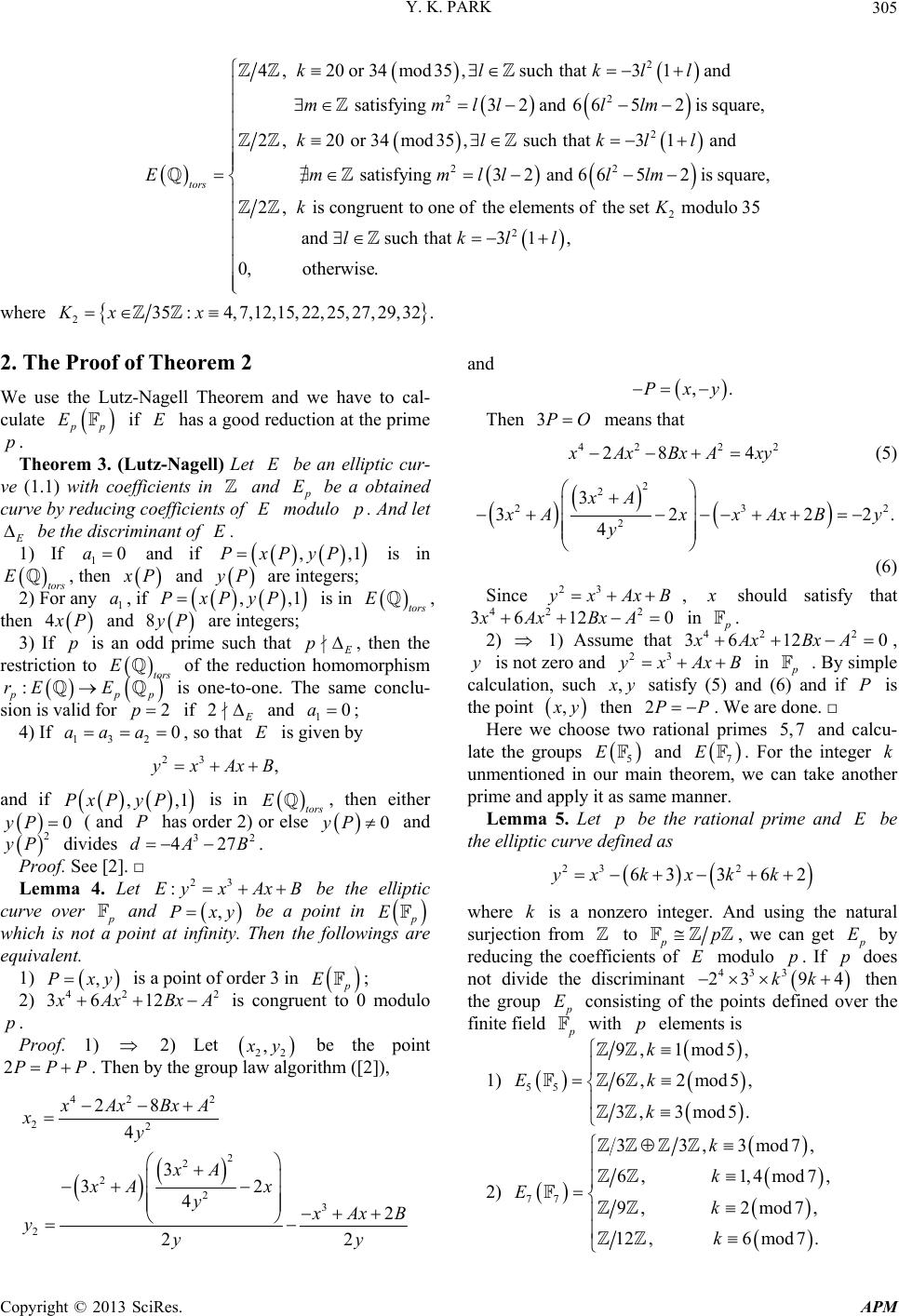 Y. K. PARK 305 2 22 2 22 4,20or34mod 35,suchthat31 satisfying32and665 2,20or34mod 35,suchthat31 satisfying32and 665 2,is congruentto one tors kl mmlll kl Emmll k 2 2 of theelementsof theset andsuch that31, 0, otherwise. K lkll and 2issquare, and 2issquare, kll lm kll llm modulo 35 where 5, 27, 29,32Kx x 235:4, 7,12,15, 22, 2. 2. The Proof of Theorem 2 We use the Lutz-Nagell Theorem and we have to cal- culate p EE E if has a good reduction at the prime . pTheorem 3. (Lutz-Nagell) Let be an elliptic cur- ve (1.1) with coefficients in and E Ep be a obtained curve by reducing coefficients of modulo . And let E ,,1PyP be the discriminant of . 1) If 1 a and if is in , then 0Px tors E P and P are integers; 2) For any 1, if is in a ,PxPy ,1P tors E, then 4 P and 8 P are integers; 3) If is an odd prime such that p p , then the restriction to of the reduction homomorphism Etors : p is one-to-one. The same conclu- sion is valid for if p E 2p rE 2 and ; 1 4) If , so that is given by 0a 2 0E 23 , 13 aaa xAxB ,1 E P 0yP and if is in tors , then either ( and has order 2) or else ,PxP yP 0yP and divides . 2 yP 32 27B x Ax 4dA 23 :Ey Proof. See [2]. □ Lemma 4. Let be the elliptic curve over B and be a point in ,Pxy E ,Pxy which is not a point at infinity. Then the followings are equivalent. 1) is a point of order 3 in E 42 36 12 ; 2) 2 Ax Bx , A is congruent to 0 modulo . pProof. 1) 2) Let 22 y PPP be the point . Then by the group law algorithm ([2]), 2 42 28xBx 2 22 2 2 2 2 3 2 4 3 32 42 22 xA A xy xA xA x y Ax B yyy and ,.Pxy 3PO means that Then 42 22 28 4 AxBx Axy (5) 2 2 232 2 3 3222. 4 xA AxxAxBy y 23 (6) should satisfy that xAxBSince , 42 2 36 120xAxBxA in 42 2 36 120xAx BxA y23 . 2) 1) Assume that , is not zero and xAxB in , . By simple calculation, such y P satisfy (5) and (6) and if is the point y2PP then 5,7 . We are done. □ , Here we choose two rational primes and calcu- late the groups E Ek p E 5 and 7. For the integer unmentioned in our main theorem, we can take another prime and apply it as same manner. Lemma 5. Let be the rational prime and be the elliptic curve defined as 23 2 633 62yxkxkk k where is a nonzero integer. And using the natural surjection from to pp , we can get E Ep p 433 2394kk by reducing the coefficients of modulo . If does not divide the discriminant then the group E consisting of the points defined over the finite field p with elements is 1) 55 9, 1mod5, 6, 2mod5, 3, 3mod5. k Ek k 2) 77 33,3mod7, 6, 1,4mod7, 9, 2mod7, 12,6mod 7. k k Ek k Copyright © 2013 SciRes. APM 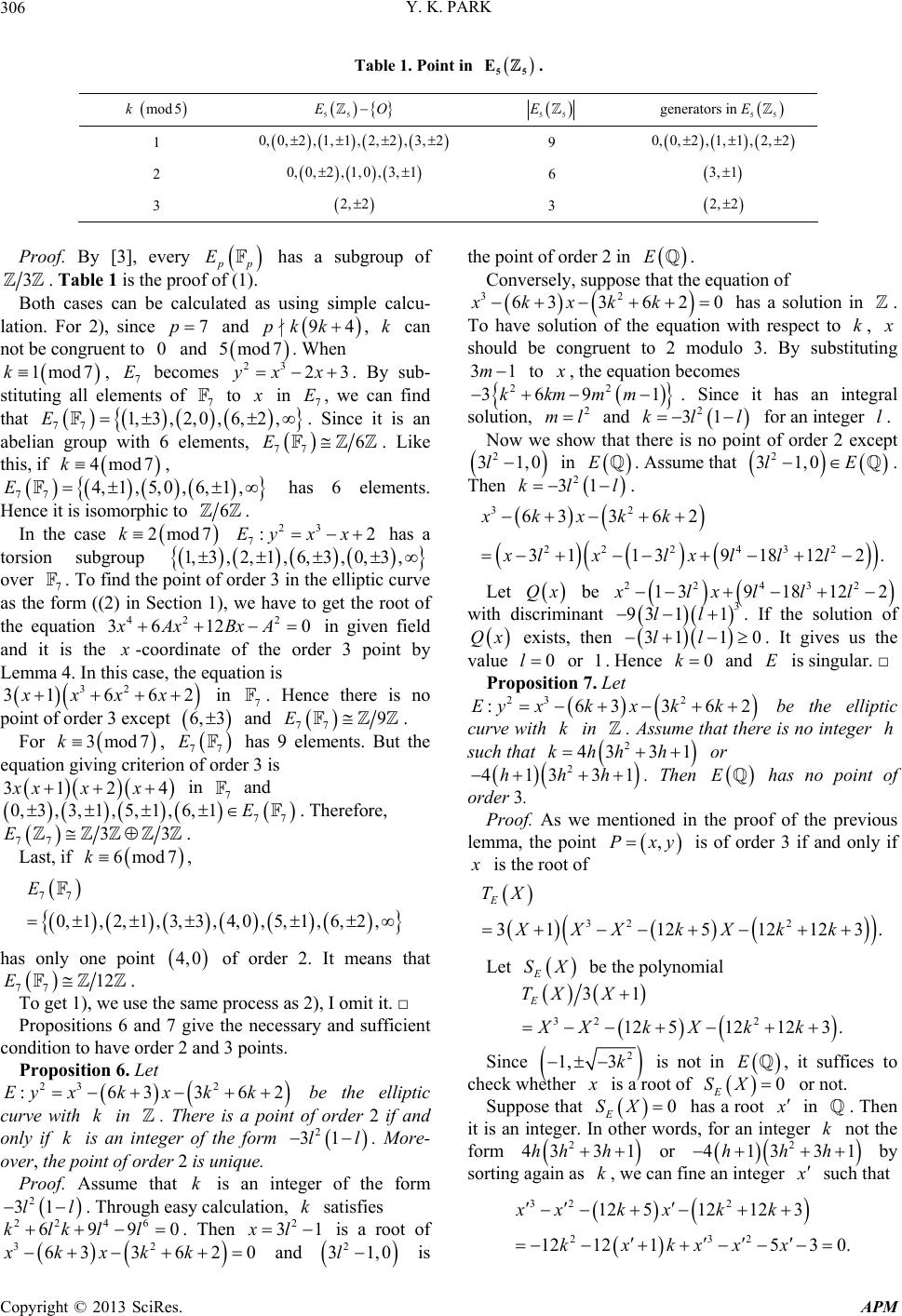 Y. K. PARK 306 Table 1. Point in 55 E k mod 5 . 55 EO 55 E 55 E generators in 1 ,2, 2,3,20,0, 2,1, 1 9 0,0, 2,1, 1,2, 2 2 2 ,1,0 ,3,1 3, 1 2, 2 0, 0, 6 3 3 2, 2 p has a subgroup of E. E Proof. By [3], every 3 7p 94pkk . Table 1 is the proof of (1). Both cases can be calculated as using simple calcu- lation. For 2), since and , can not be congruent to and k 0 d7 23 5mo . When , 7 becomes od7 E1mk23 xx. By sub- stituting all elements of to 7 in 7, we can find that E , 3,2, 0,6,2 77 . Since it is an abelian group with 6 elements, 1,E 77 6 E . Like this, if , 77 has 6 elements. Hence it is isomorphic to 7 5,0,6, 1, 4mk 4, od 1, E 6. In the case has a torsion subgroup d7 2mok23 :2x x 7 Ey ,6,3 ,0,3 , over 7. To find the point of order 3 in the elliptic curve as the form ((2) in Section 1), we have to get the root of the equation in given field and it is the 1,3 ,2,1 42 36 12xAxBx 2 0A -coordinate of the order 3 point by Lemma 4. In this case, the equation is in 7. Hence there is no point of order 3 except and 31xx 32 662xx 6, 3 77 For , has 9 elements. But the equation giving criterion of order 3 is in and . Therefore, 9 4x7 77 1 ,6,1E E. od7 77 E3mk 2x 3,1,5, 31xx 0,3, 77 E33 6mod7k , 6,2, . Last, if , 77 E 0,1, 2,1,3,3, 4,0 ,5,1 4,0 has only one point of order 2. It means that 77 E 23 2 :63362Ey xkxkk 2 31ll 2 31lk 22 46 9kl ll2 31xl 20 x 2 31,0l 12 . To get 1), we use the same process as 2), I omit it. □ Propositions 6 and 7 give the necessary and sufficient condition to have order 2 and 3 points. Proposition 6. Let be the elliptic curve with in . There is a point of order 2 if and only if is an integer of the form . More- over, the point of order 2 is unique. k k Proof. Assume that is an integer of the form . Through easy calculation, satisfies . Then is a root of and is the point of order 2 in k l 69 k 3 63 0 6k 2 3kxk Conversely, suppose that the equation of 32 633 620xkxkk k has a solution in . To have solution of the equation with respect to , should be congruent to 2 modulo 3. By substituting , the equation becomes 31m to 22 369 1kkmmm 2 ml . Since it has an integral solution, 2 31kll l for an integer . and Now we show that there is no point of order 2 except 2 31,0l in E. Assume that 2 31,0lE. Then 2 31kll. 32 222432 633 62 311391812 2. xkxkk xlxlx lll 22432 139 18 122xlxlll Qx be Let 3 93 11ll with discriminant . If the solution of Qx exists, then 311 0ll 0l. It gives us the value or 1. Hence and is singular. □ 0kE Proposition 7. Let 23 2 :63362Ey xkxkk k h be the elliptic curve with in . Assume that there is no integer such that 2 433 1khhh or 2 41331hhh . Then E has no point of order 3. Proof. As we mentioned in the proof of the previous lemma, the point ,Pxy is of order 3 if and only if is the root of 32 2 31125 12123. E TX XXX kXkk E SX be the polynomial Let 32 2 31 12512123 . E TX X XXk Xkk Since 2 1, 3k E is not in , it suffices to check whether is a root of or not. 0SX E Suppose that 0SX E has a root k in . Then it is an integer. In other words, for an integer not the form 2 433 1hh h 2 41331hhh k or by sorting again as , we can fine an integer such that 32 2 232 12 51212 3 1212153 0. xxk xkk kxkxxx Copyright © 2013 SciRes. APM 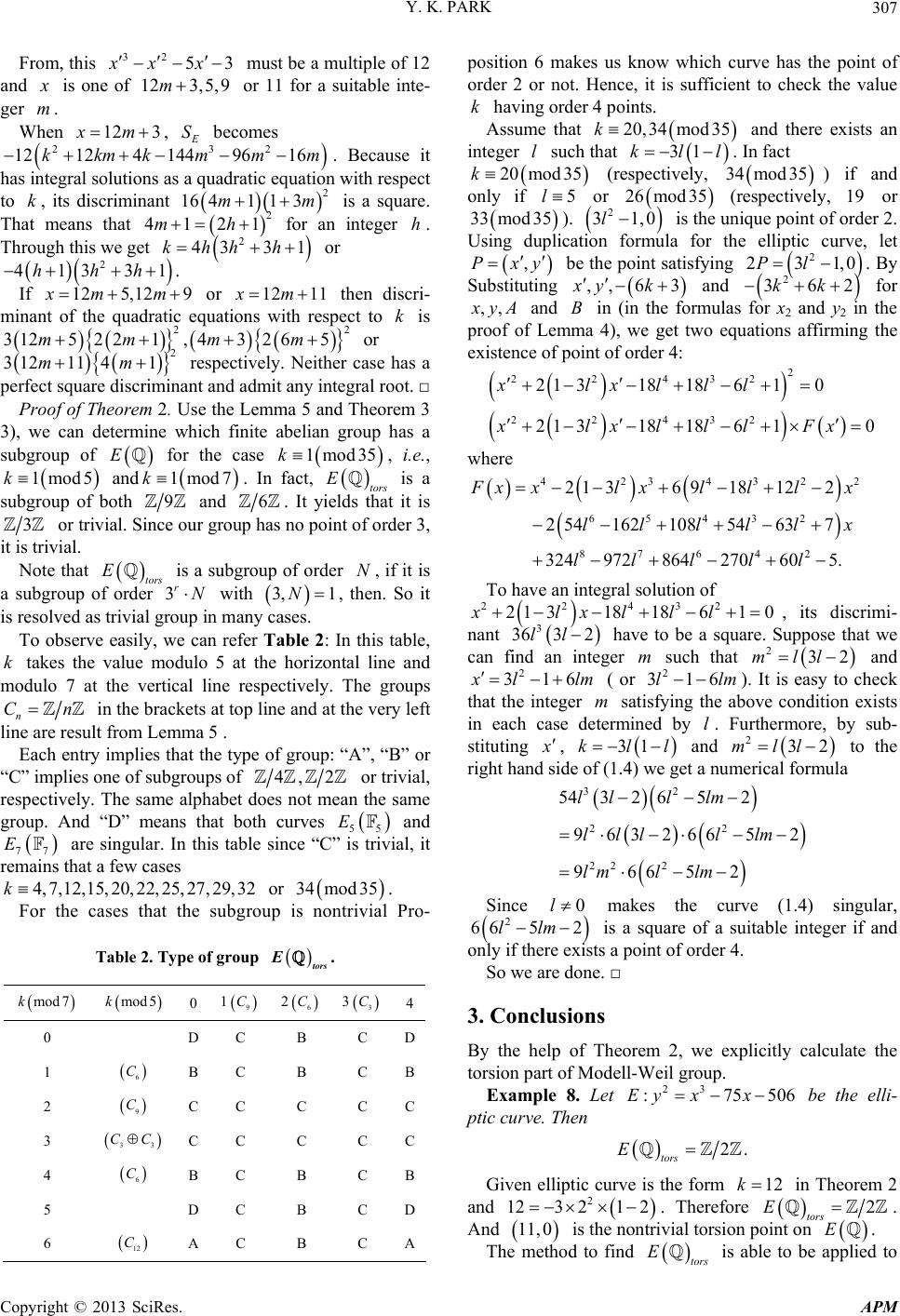 Y. K. PARK 307 From, this must be a multiple of 12 and 32 53xx x is one of 12 or 11 for a suitable inte- ger . 3,5,9m 12 3m m When , x S 32 96 16mm 2 1 13mm 2 21hh 23hh 12xm k 22 2 5m becomes . Because it has integral solutions as a quadratic equation with respect to , its discriminant is a square. That means that for an integer . Through this we get or . 2 4 144mkm 16 4 41m 43kh 31h 5,12 9m 12 k 41 12kk 2 3hh 12xm 1 11 If or then discri- minant of the quadratic equations with respect to is or 3125 31211m 1, 4mm 2 1m 2 23m 4 6 respectively. Neither case has a perfect square discriminant and admit any integral root. □ Proof of Theorem 2. Use the Lemma 5 and Theorem 3 3), we can determine which finite abelian group has a subgroup of E for the case 1mod35 k E k 1mod7 , i.e., and. In fact, tors is a subgroup of both od51mk 9 and 6. It yields that it is 3 or trivial. Since our group has no point of order 3, it is trivial. Note that tors is a subgroup of order , if it is a subgroup of order with , then. So it is resolved as trivial group in many cases. EN 3, 1N k 3rN To observe easily, we can refer Table 2: In this table, takes the value modulo 5 at the horizontal line and modulo 7 at the vertical line respectively. The groups n in the brackets at top line and at the very left line are result from Lemma 5 . Cn Each entry implies that the type of group: “A”, “B” or “C” implies one of subgroups of 4, 2 or trivial, respectively. The same alphabet does not mean the same group. And “D” means that both curves 55 and 77 are singular. In this table since “C” is trivial, it remains that a few cases or 34 . E E mod 35 4,7,12,15, 20,k22, 25, 27, 29,32 For the cases that the subgroup is nontrivial Pro- Table 2. Type of gr oup tors E k . mod 7k mod 5 0 1 position 6 makes us know which curve has the point of order 2 or not. Hence, it is sufficient to check the value having order 4 points. k Assume that 20,34mod 35k l 31kll and there exists an integer such that . In fact 20mod 35k 34mod 35 5l (respectively, ) if and only if 26mod 3519 (respectively, or or 33mod 35). 2 31,0l is the unique point of order 2. Using duplication formula for the elliptic curve, let ,Pxy 2 231,0Pl be the point satisfying . By Substituting ,, 63xyk 2 362kk ,, and for yA B and in (in the formulas for x2 and y2 in the proof of Lemma 4), we get two equations affirming the existence of point of order 4: 2 22432 22432 21 31818610 21 31818610 xlxlll xlxlllFx 9 C 2 6 C3 3 C4 0 D C B C D 1 6 C 9 C B C B C B 2 C C C C C 3 33 CC 6 C C C C C C 4 B C B C B 5 D C B C D 6 12 C A C B C A where 4234322 65432 87642 21 36918122 25416210854637 324 972 864270605. xxlxl l lx lllllx lllll To have an integral solution of 22432 21 31818610xlxlll , its discrimi- nant 3 36 3 2ll have to be a square. Suppose that we can find an integer such that and m 232mll 2 316 llm 2 316llm ml ( or ). It is easy to check that the integer satisfying the above condition exists in each case determined by . Furthermore, by sub- stituting , 31kll 232mll and to the right hand side of (1.4) we get a numerical formula 32 22 22 2 5432 652 963266 52 96652 llllm lllllm lml lm 0l Since makes the curve (1.4) singular, 2 66 52llm 23 :75506Ey xx is a square of a suitable integer if and only if there exists a point of order 4. So we are done. □ 3. Conclusions By the help of Theorem 2, we explicitly calculate the torsion part of Modell-Weil group. Example 8. Let be the elli- ptic curve. Then 2. tors E 12k Given elliptic curve is the form in Theorem 2 and 2 123 212 . Therefore 2E tors . And 11,0 is the nontrivial torsion point on E. tors E is able to be applied to The method to find Copyright © 2013 SciRes. APM 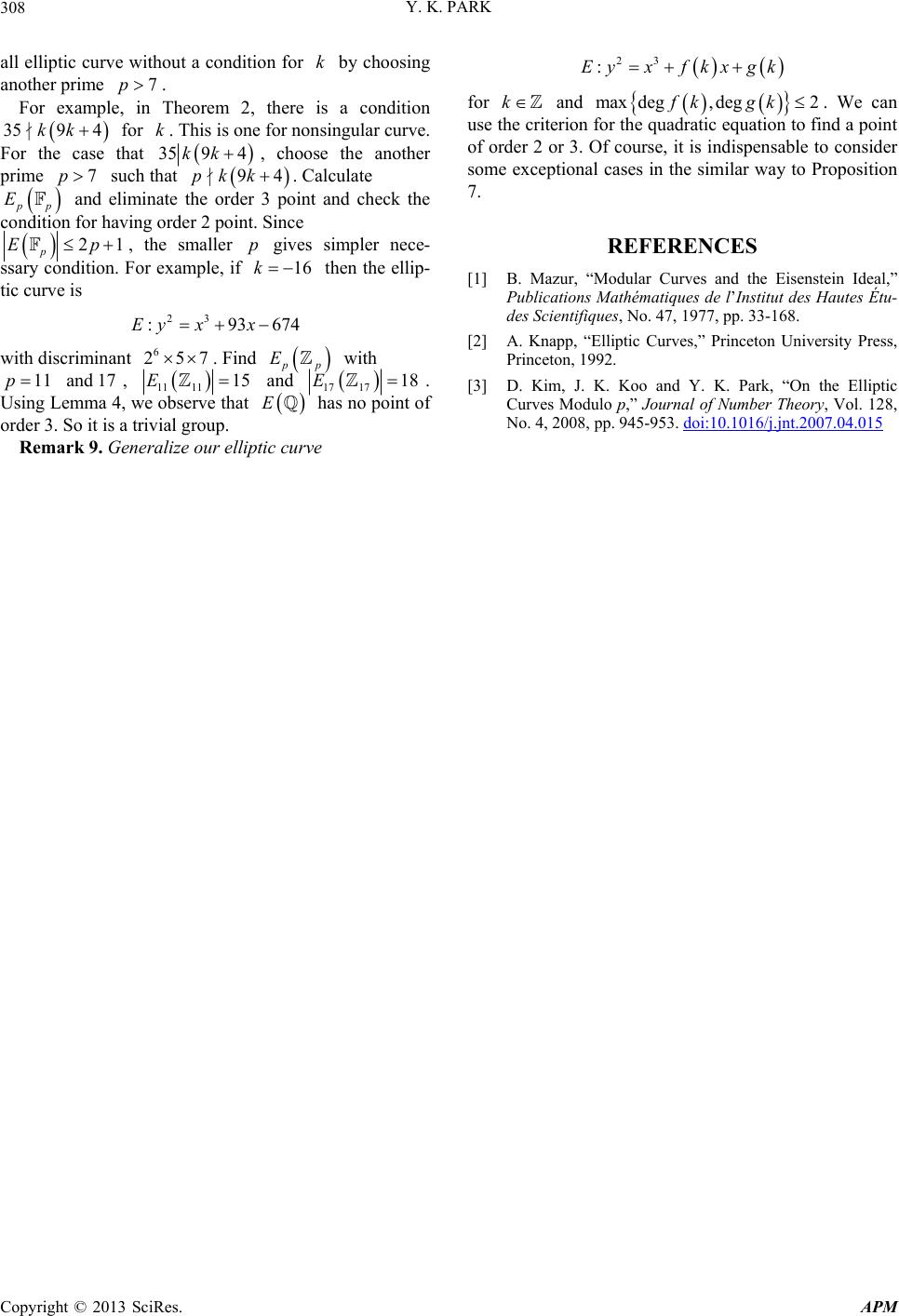 Y. K. PARK t © 2013 SciRes. APM 308 k 7p Copyrigh all elliptic curve without a condition for by choosing another prime . For example, in Theorem 2, there is a condition 359 4kk for . This is one for nonsingular curve. For the case that k 35 9kk4 , choose the another prime such that 7p 94kpk . Calculate p and eliminate the order 3 point and check the condition for having order 2 point. Since E 21p p, the smaller gives simpler nece- ssary condition. For example, if then the ellip- tic curve is Ep 16k :93674x 23 x 7 Ey with discriminant . Find 6 25 p E with and, 11 17p 11 11 and 15E 17 1718E . Using Lemma 4, we observe that E 23 :Eyxfkx gk k has no point of order 3. So it is a trivial group. and for maxdeg,deg2fkgk . We can use the criterion for the quadratic equation to find a point of order 2 or 3. Of course, it is indispensable to consider some exceptional cases in the similar way to Proposition 7. REFERENCES [1] B. Mazur, “Modular Curves and the Eisenstein Ideal,” Publications Mathématiques de l’Institut des Hautes Étu- des Scientifiques, No. 47, 1977, pp. 33-168. [2] A. Knapp, “Elliptic Curves,” Princeton University Press, Princeton, 1992. [3] D. Kim, J. K. Koo and Y. K. Park, “On the Elliptic Curves Modulo p,” Journal of Number Theory, Vol. 128, No. 4, 2008, pp. 945-953. doi:10.1016/j.jnt.2007.04.015 Remark 9. Generalize our elliptic curve
|